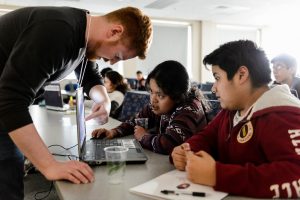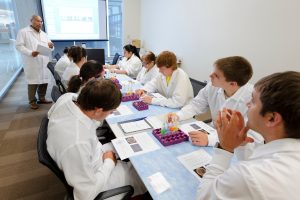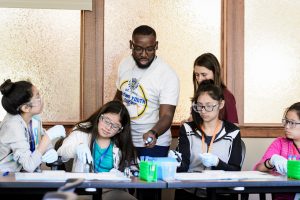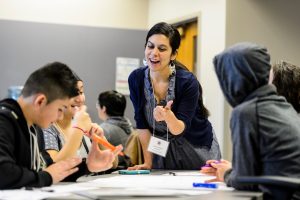By Ron Jakubisin, Positive Youth Development Extension Educator
Just to clarify, I’m not the expert being referred to in the title! I have had a few decades of experience in facilitating team-building activities, ice-breakers, and group brain teasers but I feel I am always learning, always refining, but still working on ‘expert’ status. I have learned a lot from author Tom Jackson, M. Ed. who published a series of books, his first being Activities That Teach (copyright 1993 by Tom Jackson. Library of Congress-in-Publication Card number 93-161619). The book is filled with leadership and life skill lesson-based activities which include life skill topic, time needed, supplies and process questions for the activity facilitator. I have found Tom Jackson’s books at the library, as well as for purchase on Amazon and eBay.
I use his books constantly and re-read his tips on what he identifies as the active learning process and how to facilitate activities. I’d like to share my ‘take-aways’ and tips that I learned from his books.
The active learning process when using team-building activities/games is most effective when these benchmarks are achieved:
- General concept is presented to the group
- Activity is undertaken by the group, the facilitator does not offer solutions but can encourage the group to stop and process progress, success/roadblocks on their own
- Group explores actions and consequences (positive and/or negative) during the activity
- Group discussion is held immediately following the conclusion of the activity
- General principles are discussed
- Specific life applications are derived from the general principles
- Life applications are internalized by participants
- Students act on what they have learned (or understand how they can act on what they’ve learned)
Probably the biggest pointer I can give, which is echoed in Tom’s books, is that the process is just as important, if not more, than finishing the activity. Time may have run out, or the group’s progress hit roadblocks, like frustration, poor communication, etc. but there are lessons to be pointed out to the participants. As a facilitator, you celebrate progress, point out roadblocks and lead the group to see all sides of the activity. For example, Build A Tower (with straws and gumdrops) is a fun team building activity. Group One constructed the tallest tower, but argued, had a dictator, didn’t follow a plan and two members quit altogether, whereas Group Two only finished two levels of a planned 6 level tower, but cooperated, honored all ideas, reached consensus and construction was as planned (they just ran out of time). One group had more problems with the process but finished, the other had an excellent process but didn’t finish the goal. The facilitator’s responsibility for everyone to see successes and roadblocks and learn from the process.
Other tips for the facilitator include:
- Be prepared for imperfection (observe process, not just finishing)
- Create a physically safe space when doing activities (more important the more you have movement in the activity)
- Create a psychologically safe environment for all (ground rules)
- Establish a ‘freeze’ command (a word, clock alarm, whistle)
- Challenge by Choice: you have the right to pass, but not the right to mess it up for others. If a participant doesn’t want to engage don’t let them sit out in the hall, make them stay in their group, and they can verbalize if they want to ‘pass’.
- Don’t give solutions to problem-solving activities, encourage exploring options, reaching consensus, trying options and evaluating progress with a participant’s offered strategy.
Prepare and Practice! It is important for facilitators to understand their role and the basic steps mentioned in this article. First-time facilitator and youth facilitators should prepare and practice before leading a group activity. Have discussion questions ready ahead of time. Anticipate where there may be difficulties with the group or individuals and have scripted strategies to get the group or individuals engaged/re-engaged in the activity.
If you’d like more facilitator tips, strategies or picking effective activities that teach, feel free to contact Ron Jakubisin, Positive Youth Development Educator at Ron.Jakubisin@wisc.edu or call his office at 920-929-3144.








